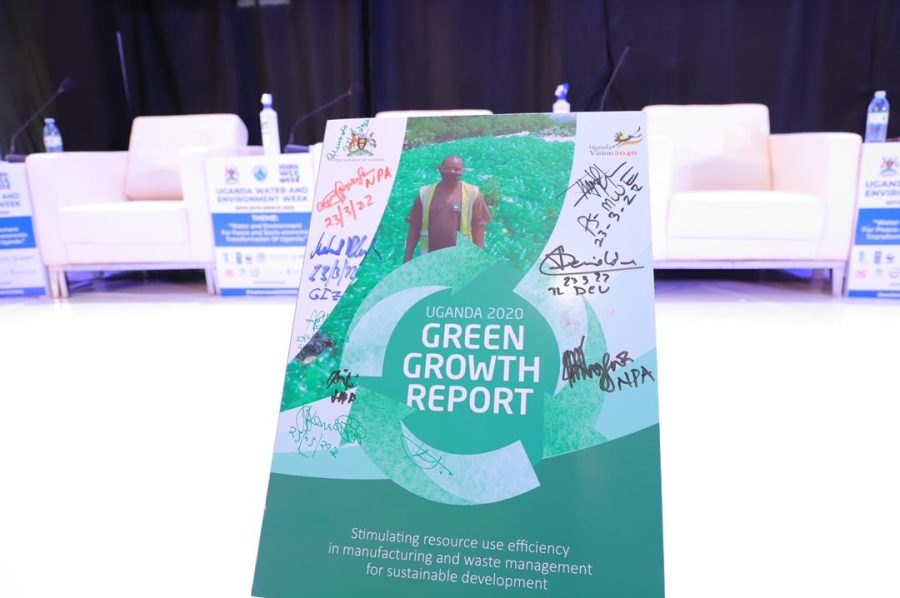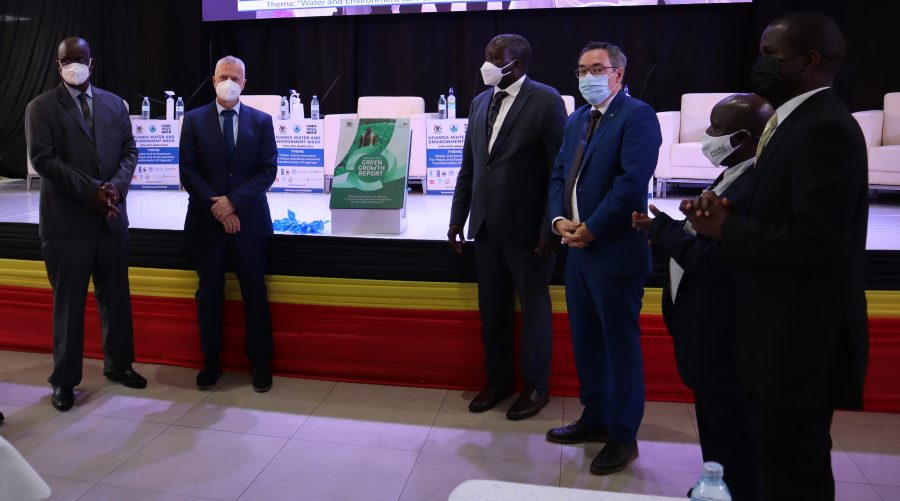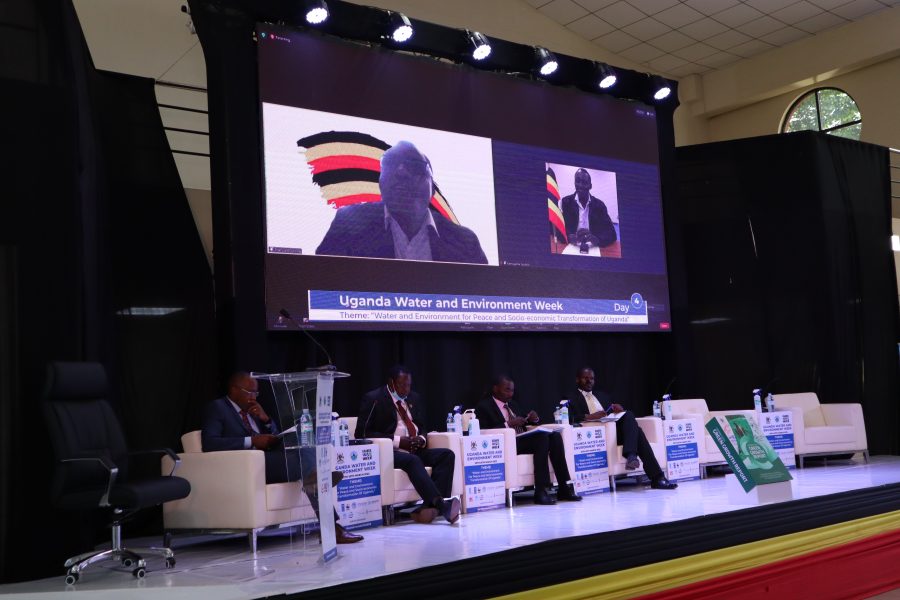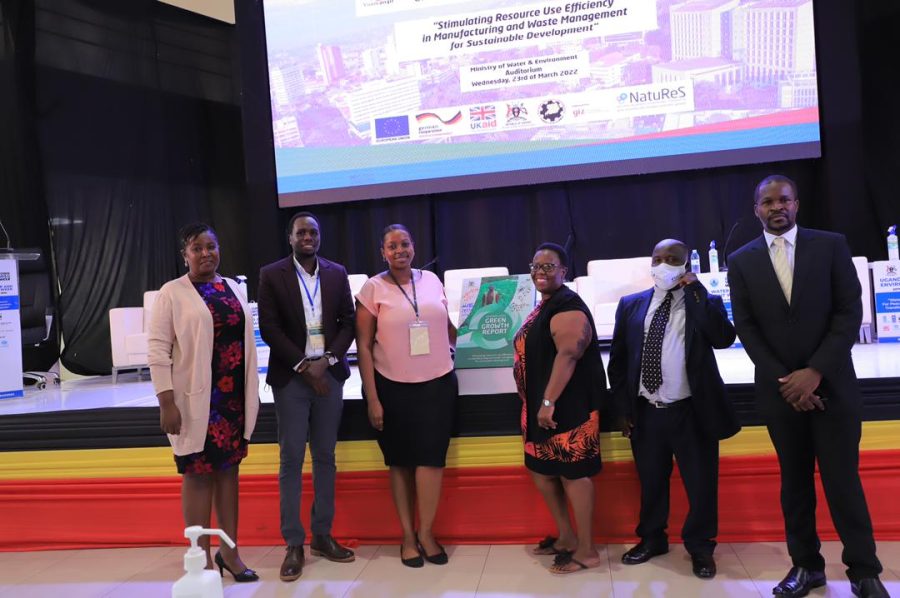Uganda launches its first ever Green Growth Report
Uganda’s economy is highly dependent on its natural resources. Therefore, it is critical that the country pursues a green growth path in its economic development. The route to inclusive, low-emission economic growth for Uganda is led by the Uganda Green Growth Development Strategy (UGGDS). The Strategy strengthens fundamentals to harness existing green growth opportunities to realize Uganda’s 2040 Vision. However, since the inception of this strategy, there has been no monitoring report to track it. Uganda’s National Planning Authority (NPA), in collaboration with the Ministry of Water and Environment (MWE) with the support of NatuReS, developed the country’s first Green Growth Report under the theme “Stimulating resource use efficiency in manufacturing and waste management for sustainable development”.

The report highlights key observations in Uganda’s green growth progress between 2017-2020, emerging issues, as well as challenges. It also strengthens the opportunities for scaling up green manufacturing and waste-to-wealth activities and mentions policy concerns. It moreover identifies, documents and reports lessons learned as ways to strengthen the activities required to achieve sustainable manufacturing and waste management in Uganda.
Launch of the Uganda Green Growth Report
As part of the Uganda Water and Environment week (UWEWK) 2022, on Wednesday, 23rd of March, the National Planning Authority (NPA), officially launched the 2020 Uganda Green Growth Report, an event that took place delayed due to Covid-19 restrictions in 2021. The launch was carried out in collaboration with the Ministry of Water and Environment and with the support of GIZ NatuReS. UWEWK provided a great platform for an interface between sector actors and other stakeholders for knowledge exchange, dialogue and joint learning for the improvement of Uganda’s water and environmental resources.
The launch attracted high-level political and technical participation, including the Permanent Secretary of the Ministry of Water and Environment, Mr. Alfred Okot Okiidi, the Deputy Chairperson at NPA, Prof. Sam Obwoya, EU Team Leader for Inclusive Green Growth, Mr. Lennart Deridder, and GIZ Portfolio Manager Dr. Michael Klingler. Moreover, representatives of the EU Delegation in Uganda, city clerks, public and private sector executive directors, and other key stakeholders joined the launch event.

Key remarks during the event
Mr. Alfred Okot Okidi, the Permanent Secretary of the Ministry of Water and Environment, gave the opening remarks. He highlighted that urban development has significantly increased in the country, with waste management representing a significant accompanying challenge, among the many concerns being part of the county’s urbanization trend. Demographic pressures on water and environmental resources furthermore pose a threat to the long-term viability of natural resource-based environmental services that are essential for livelihoods and businesses. He emphasized that it is now more important than ever for the various actors across the country to work together towards inclusive and resilient economic growth. Mr. Okidi urged everybody in their different capacities to reflect on the report, heed its recommendations, keep up and strengthening already ongoing progress, and improve on the areas where progress is still lagging.
Prof. Sam Obwoya Kinyera, Vice-Chairperson from the National Planning Authority (NPA), highlighted that the Green Growth Monitoring Report was informed by three national flagship documents, namely the Uganda Green Growth Development Strategy (UGGDS), the National Development Plan III (NDP III) and the Uganda Vision 2040. He also noted that Uganda has 22 designated industrial parks across the country, which represent business opportunities but also come along with environmental challenges. He therefore proceeded to underscore the need to monitor the state and adoption of green growth technologies and sustainable waste management practices. He also highlighted that there is a need to harness the investment opportunities described in the report and support the identification of best practices that support the sustainable management of waste, occupation safety, and green manufacturing that can be replicated elsewhere. He stated that the National Planning Authority will rally investors and other development partners to drive the green growth agenda in Uganda.
Following these remarks, Mr. Lennart Deridder, the Team Leader for Inclusive Green Economy at the EU Delegation in Uganda, highlighted the significance of the report to Uganda. He stated that the private sector is very crucial in its implementation, which is why the European Union is supporting the “Sustainable Business for Uganda” platform, which brings Ugandan and European entrepreneurs together with the public sector to promote sustainable investment and responsible growth. He noted that four working groups have been launched to discuss areas that are critical for improving the sustainable investment in climate protection, including access to finance, skills and attitude, governance and trade.
Panel Discussion: Existing green growth opportunities and mechanisms for enabling the uptake of the Green Growth Report

The launch of the report was followed by a panel discussion focusing on the Green Growth Report and its operationalization.
Regarding green growth opportunities within the Water and Environment sector, Mr. Collins Oloya, Director at the Directorate of Environmental Affairs (MWE), noted that the Ministry has initiated the promotion of industrial symbiosis where waste from one industry becomes the resources (raw materials) of other industries.
Mr. Francis Kisirinya, the Deputy Executive Director of Private Sector Foundation Uganda (PSFU) noted that small factories which are currently using diesel fuel for production should switch to more reliable and renewable biomass energy, just like the big companies. Also, industries should ensure that they save resources where possible.
Also, Mr. Jospeh Kyalimpa from the Uganda Manufacturers Association (UMA) expressed the need for bottling companies to follow-up and recycle the bottles they produce as mechanisms for the adoption of the recommendations of the green growth report. He noted that UMA is strategizing to accelerate the green growth agenda, bearing in mind the existing Extended Producer Responsibility (EPR) provisions in the latest National Environment Act. This is done e.g. by piloting an EPR scheme in Greater Kampala Metropolitan Area before scaling it up across the country.
Following him, Mr. Godwin Kamugisha from the National Environment Management Authority (NEMA) noted that companies are supported through the provision of an Environmental and Social Impact Assessment Certificate to create an enabling environment for carbon trading as one of NEMA’s approaches to support Green House Gas (GHG) emission trade etc.
Operationalization of the report: What is needed and will be done to ensure uptake of recommendations

Dr. Florence Grace Adongo, Director of Directorate of Water Resources Management at the Ministry of Water and Environment, noted that research is an important factor in promoting innovative green growth practices. She stated that there is often insufficient financing to move good interventions to implementation and that there is a need to strengthen institutions to foster compliance. She lamented a lack of monitoring mechanisms, notwithstanding the fact that data availability is critical for evident-based reporting. Dr. Florence also emphasized the importance of aligning monitoring and reporting mechanisms, including digital reporting, to be able to implement the green growth strategy by 2030.
The report’s operationalization road map was presented by Mr. Ronal Kaggwa, the National Planning Authority’s Manager of Production, Trade, and Tourism Planning. It includes activities aimed at incorporating the recommendations from the green growth report into city development plans as well as facilitating adoption by public and private sectors. Among these activities are:
- Dissemination of the Uganda Green Growth Report to programme lead agencies and cities
- Development of mechanisms for voluntary green growth reporting
- Exploration and identification of investment opportunities for horizontal and vertical integration of agro-processed products
- Development of mechanisms for incorporating investments in gender and inclusivity awareness as an industrial reporting output.
- Development of composite macroeconomic indicators for green growth integration into fiscal policy and planning
- Identification and operationalization of partnerships financing support to SMEs and addressing the legal challenges identified in the report
- Monitoring, evaluation, and provision of oversight during the implementation of the road map
For more information on the 2020 Uganda Green Growth Report, download the report policy brief. Also, follow us on Twitter to stay up to date if you don’t already.